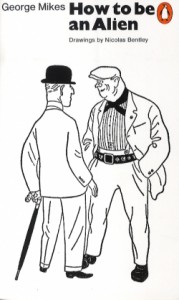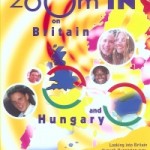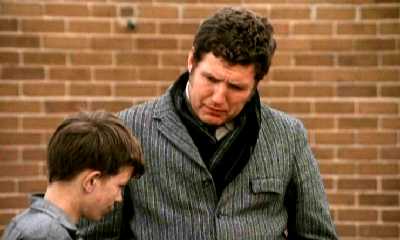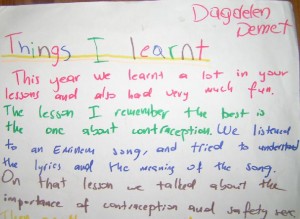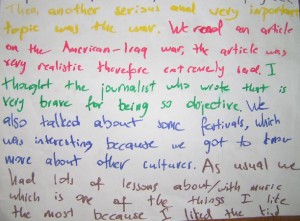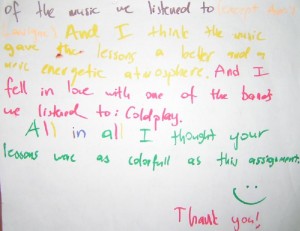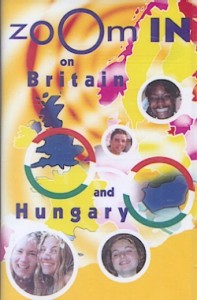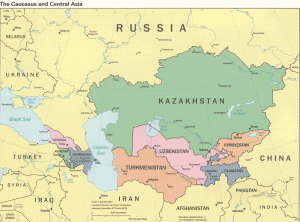How not to be an alien
The linguistic,cultural and educational benefits of learning English abroad.
When I arrived in England I thought I knew English. After I’d been here an hour I realised that I did not understand one word. In the first week I picked up a tolerable working knowledge of the language and the next seven years convinced me gradually but thoroughly that I would never know it really well, let alone perfectly. This is sad. My only consolation being that nobody speaks English perfectly.
These were the words of the famous Hungarian Mikes György or George Mikes in English from his little book “How to be an Alien” In it he describes his observations of both the English language and the culture he encountered as a journalist when he was there as a young man. In order to write his little book he kept a diary of all the interesting little things he noticed and then turned them into a kind of “What are the English like as seen by a Hungarian”. While the book is fairly dated now it is still an entertaining read and can be a good springboard for discussing how we get to know languages and cultures better.
My own formative experiences of getting to know other countries and cultures
I have often wondered how I myself got into languages and travelling and I can point to two very formative experiences that I had, one at the age of 10 and the other at the age of 16.
In the 1930’s cruises for schoolchildren were pioneered in Britain using troopships that were not used during the summer and in 1967 for the price of £29 then, I was lucky enough to take part in one of these educational experiences. At sea, on the way to Norway we had lessons about where we were going to in classrooms on board ship and when we were in Norway, after being on land all day, in the evenings we wrote up our logs or diaries recording our experiences when we weren’t enjoying Norwegian folk dancing.
For all of us it was the first experience of foreign travel and the educational value was considerable, we were exposed to history, geography, other religions, bits of Norwegian, the fact that there was another currency, and on some trips, to Egypt for example, children witnessed terrible poverty leading sometimes to life-changing attitudes towards life and the world.
We went in May during term time. I’d love to know now who organised it and how many schools were contacted about the scheme. I went to a little primary school where we had a fairly even mixture of children from working-class and middle-class backgrounds.
I was only 10 when I went on the M.S. Devonia to Norway and was introduced to Norwegian stave churches and outdoor markets. It was the first time I saw live fish in a tank for sale in Bergen and we were also taken to the composer Edvard Grieg’s grave and his summer residence. It was my first trip “abroad” if you don’t count Wales, and the first time I was made aware of another culture and language.
My German experience

That ITT machine which I remember playing Abba's Waterloo, Terry Jacks' Seasons in the Sun and Je t'aime..moi non plus! Ahhhhhh. All hits of spring 1974
At the age of 16 I had the good fortune to spend 10 weeks in two West German families and went to school there and got to know a very different school culture from the one I had been used to, without school uniforms and “sitzenbleiben”, a strange idea for me, that if you didn’t get the necessary marks you had to “remain sitting” and do the whole year again.
In the families I stayed in I saw a dishwasher, a breadcutting machine and an ITT cassette recorder for the first time, as well as being told to comb my hair properly before breakfast and take my shoes off when I entered the house.
“The families I was staying were both well-off, one a “Zeit reading” forester and the other an architect. I was wowed by machines to cut bread and an ITT cassette recorder. The daughter of the family, Daniela, had got an ABBA tape and the Swedish group had just won the Eurovision song contest with Waterloo. I was so jealous, not of the bread machine but of the cassette recorder. At home we’d only got one of those reel to reel things and this ITT machine looked so cool.
These experiences were the most formative experiences of my earlier years and they raise the question of how we can create experiences for young people which involve engagement with other cultures, learning about them and which in turn potentially lead to a better understanding of your own culture.
With the German experience, I came back not only much better at German, but much more motivated to learn more German. It also whet my appetite for travel abroad in general and I think I can safely say I would never have gone on to study languages at university without that experience. It was a very influential period of my life. On returning my German teacher remarked in my school report: “His sojourn in Germany has added a new dimension to his German studies.”
The role of ethnography in organising trips abroad
Bronislaw Malinowski, who was born in Krakow, is known as the founder of social anthropology. He is also remembered as the father of the functionalist school of anthropology as well as for his role in developing the methods of anthropological fieldwork. Malinowski is famous for his studies conducted among the Trobriand Islanders whose marriage, trade, and religious customs he studied extensively.
We owe a lot to Malinowski and the advantage of an ethnographic approach is that it combines the analytical and the experiential (or the cognitive and the affective). “The ethnographer is participating, overtly or covertly, in people’s daily lives for a period of time, watching what happens, listening to what is said, asking questions – in fact, collecting whatever data are available .” (M. Hammersley & P. Atkinson)
We can encourage students and children to do exactly the same thing when they are away somewhere on trips, even trips within their own countries. An application of ethnography and a good teacher can help students to get the most out of language learning and cultural experiences by equipping them with the techniques, support and encouragement necessary for turning a more passive tourist experience into one where they begin to understand the other country, their own country and themselves better.
Aims of organising classes which prepare students for a trip abroad
Increasingly, it is becoming more possible to take students to Britain for short periods and the value of structuring these experiences in order to maximise the learning is enormous. 15 years ago I supervised a student dissertation in the Czech Republic of somebody who took a group of young teenagers to Britain. She saw fieldwork as an integral part of the trip and before the students went she organised 8 preparatory classes beforehand. The aims of the 60-minute sessions were:
* to get to know each other better, to work on building the group and to set up a good working atmosphere (students of different ages and from different classes were asked to work in groups or pairs that were often changed).
* for the teachers to find out how much the students already know about Britain to be able to work with them on that basis.
* to work on a variety of topics about different aspects of life in Britain (using photographs, articles, magazines for young British people, extracts of films and documentaries and maps.
* to get the students to think about the same aspects in the Czech Republic and to get them used to consciously make comparisons between the two cultures, as one of the techniques used for observing and analyzing the target culture.
* to get them used to the habit of keeping diaries (writing a diary about the seminars, adding pictures or newspaper articles about things concerning Britain).
* to practise doing interviews, helping them with thinking about the questions they might be interested in finding out once they had the chance to talk to British people.
The three following quotes are from three of the children who were asked about the pre-trip classes during the visit to Britain.
Johana (14): “During the seminars I learnt that I do not have to worry about speaking.”
Petra (15): “My father also liked the idea of seminars. So, he decided to give me the money to go to Britain. We had seminars with our teachers and we had a diary and wrote there what we think.”
Barbora (13): “I did not know about ethnic minorities living in Britain before the classes we had before we went to Britain and now I know and I can ask people here about them.”
While in Britain students were encouraged to keep their diaries, writing down what they were doing, what they saw, who they managed to talk to, what they thought of it and how they felt. Sticking pictures, tickets or drawing into their diaries were welcomed. Every evening there was a 30-minute ‘diary-time’ to note the interesting things they had noticed both linguistically and culturally.
Lenka (15) evaluated the activity: “I have never kept a diary before. I like it, I write what I want.” “On the way to the Victorian Pier, which was our next destination, we saw a ‘lollipop lady. She is a woman and she has got a big sign ‘stop’ and she stands in the middle of the road when children want to cross the road and she stops the cars.”
One of the visits to a school Zdenek describes his feelings in a very imaginative way: “In the morning we visited their assembly. I felt very embarrassed, because all children were wearing uniforms, only our group ordinary clothes.” This is an example of where a child decentres and becomes more aware of their own culture, not so much as an alien but somebody who can distance themselves from their own culture.
My experience with working with Central and Eastern European teachers over the summer
Last summer I worked with two groups of teachers from 12 different countries mostly in Central and Eastern Europe in Barnstaple with SOL (Sharing One Language), an organisation founded by Grenville Yeo in 1991 to facilitate more educational experiences both ways between Central and Eastern Europe and Britain.
One of the courses was very much about giving teachers an ethnographic experience of England and getting them to think about how they might structure such an experience for their own teenage students. The teachers ended up talking to lots of people, including lifeguards on the beach, in order to find out more about the local community and the values and beliefs under the cultural iceberg which go beyond what is observable. These structured tasks slowly built up the teachers’ confidence in talking to people and deepened their understandings of the culture in which they were immersed for the 10-12 day period. These were some of the final comments by Alena from Slovakia in the evaluation relating to the usefulness of the activities we had done on the course.

The Croyde lifeguards the teachers interviewed last year, will they be the same this year? This was one of the highlights of our course!
“Talking to people to learn about the local environment, habits, jobs (like the lifeguards). Talking to people to find out what local or national institutions do like the National Trust and the Royal National Lifeboat Institution. Asking people real life questions such as directions. If I brought my students I’d exploit the time mainly for talking and using English in everyday conversations.”
It can be very useful to get students to ask simple questions like: “What’s the time?” and “How do you get to…” over and over again, so that they hear different variations and accents, all of which contributes to building up their confidence. And of course one of the important aspects of being abroad is to take photographs not only of the famous sights but of signs and unusual things, all of which can be a rich source of debate and language
learning.
This year I am doing these courses again and on one of the days we will be visiting an art exhibition in Torquay. How many times have you seen groups of teenagers in galleries, bored by the whole experience waiting to get out of the gallery and not enjoying the visits at all? Art offers enormous opportunites for linguistic, cultural and educational development in young people but sometimes we fail to exploit the learning potential in these experiences by not structuring the visits in a way which leads to more engagement on the part of the students with interesting tasks, worksheets and projects in general. This is one of the issues we will be discussing on our visit to the Devon Riviera, together with an exploration of Agatha Christie and her life!
In 1998, Uwe Pohl (the guy who I will be working with on our fieldwork course in Devon next week) and I took a group of Hungarian school teachers to Britain to meet lots of people, to take photographs and to get a deeper view of British society with the aim of developing materials back in Hungary and an approach to language learning which is more ethnographic and focused on the community than behaviouristic. We ended up writing a book called “Zoom In”, the aim of which in part was to get students to be both researchers of culture and language and not just behaviouristic language learners. It is based on a thoughtful, cognitive approach to language learning and one which explicity compares the culture the students/teachers come from with British culture in search of deeper understandings, an understanding of cause and effect and a more empathetic view of the world in general.
Typical field work tasks such as exploring portmanteau words with host families
One of the little tasks I will be getting the teachers to do next week will be to explore the word “staycation”. Portmanteau words are a lot of fun, Lewis Carroll developed them, James Joyce turned them into a fine art across languages in Finnegans Wake and they are a characterisic of the changing face of the English language, (e.g. blog, glog, webinar). With “staycation” it will be good to find out from different people how they would define the word and what they think of it. If it’s used, who uses it? Is it used more in written or spoken English? Is it used more by working-class or middle class people? Is it used more in some regions rather than others? It should be a lot of fun. Curiosity for and exploration of other languages is one of the delights of learning about the world and it is our job,as language teachers, to develop and encourage that same curiosity in our students.
An unforgettable experience
All in all in terms of developing motivation, an ethnographic trip to another country can be an invaluable step in changing somebody’s life for the better, it certainly was for me when I went to Norway and West Germany. I was helped not to be an alien but how to participate in our common European culture in a more equal way and in a way in which I wasn’t saying because things weren’t British it didn’t mean they were worse. I stopped wondering why people drive on the “wrong” side of the road a long time ago! At the age of 16 I was taken to the border which divided East and West Germany.
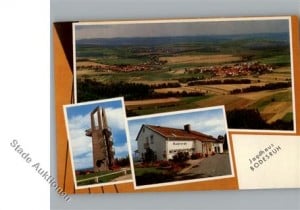
The tower I climbed when I was 16 and peered into the German Democratic Republic, a country I would find myself living in for 4 years 6 years later
“ Two years after the wall in Berlin was built in 1961, a tower was built in Bodesruh where my host family took me. From the top you could see miles into GDR territory. At the foot of the tower there was a map of the old pre-Second World War Germany, which was later to be partly dismantled, removing the parts that now belong to Poland and the Soviet Union.
Growing up in Wolverhampton, there was no real awareness of frontiers being moved or anger at having lost territories in the past. I had never met anyone who was either angry about or suffering from the lost British territories of the Indian sub-continent. I didn’t know families who had been divided by borders as I became aware of living close to the East/West German border. The day I went up that tower nobody was there to watch me in the way that the world watched when J. F. Kennedy spoke from the balcony of the Schöneberg town hall in West Berlin on June 26th 1963, 11 years earlier. For me though, this was a life-changing experience, although I didn’t realise it at the time.
I hadn’t been aware of the division of Europe, I’d given up History at school at the age of 14 and somehow I felt uneasy about what I was peering into from the top. Walls and fences cut through dense forest and marked the border between East and West.
East Germany was not a part of my families’ world any more but somehow, though, after peering over what some people called the Iron Curtain that day it had become part of mine. For a young guy just turned 17, that landmark was as important as anything that I had seen in my time away from England so far. It bothered me. 6 years later I found myself living in the GDR as a student in Rostock on the Baltic coast.
If we can structure experiences for our students that challenge their existing ways of seeing the world and motivate them to learn English more then we might achieve more in ten days than in a whole term’s work. Going abroad changed my life for ever and without that experience I certainly wouldn’t be doing the course in Devon next week in the way that I will be doing it and I certainly don’t feel like an alien here in Hungary now!
We’re all going on a summer holiday, although it’s still the case that most people in the world don’t have holidays:(
It’s June 26th today and many people will be packing up for summer now and finishing their courses. Just let me take this moment to say how much I’ve enjoyed writing the blog this year and through it and twitter I feel more connected to the ELT community worldwide than ever before. Thanks to everybody too who has made the time to read my posts.
One of the highlights of the year for me was using a flip camera to interview people at the ISTEK conference in Istanbul this year in the role of roving reporter, and next week in Devon I will be doing the same, interviewing local people to find out about their lives and to listen to the language that they use and encouraging our teachers to do the same.
Finally, Mikes György wrote “How to be an Alien”, I certainly don’t feel like an alien in Hungary and I hope our teachers don’t feel like aliens in Devon next week, in the end what unites us is far more than what divides us and far more important than what makes us different.

This classic photograph of the Earth was taken on December 7, 1972 by the Apollo 17 crew travelling towards the moon. What can you see?
A week tomorrow I will be swimming in the sea here. I wonder how many of the teachers will be joining me?

